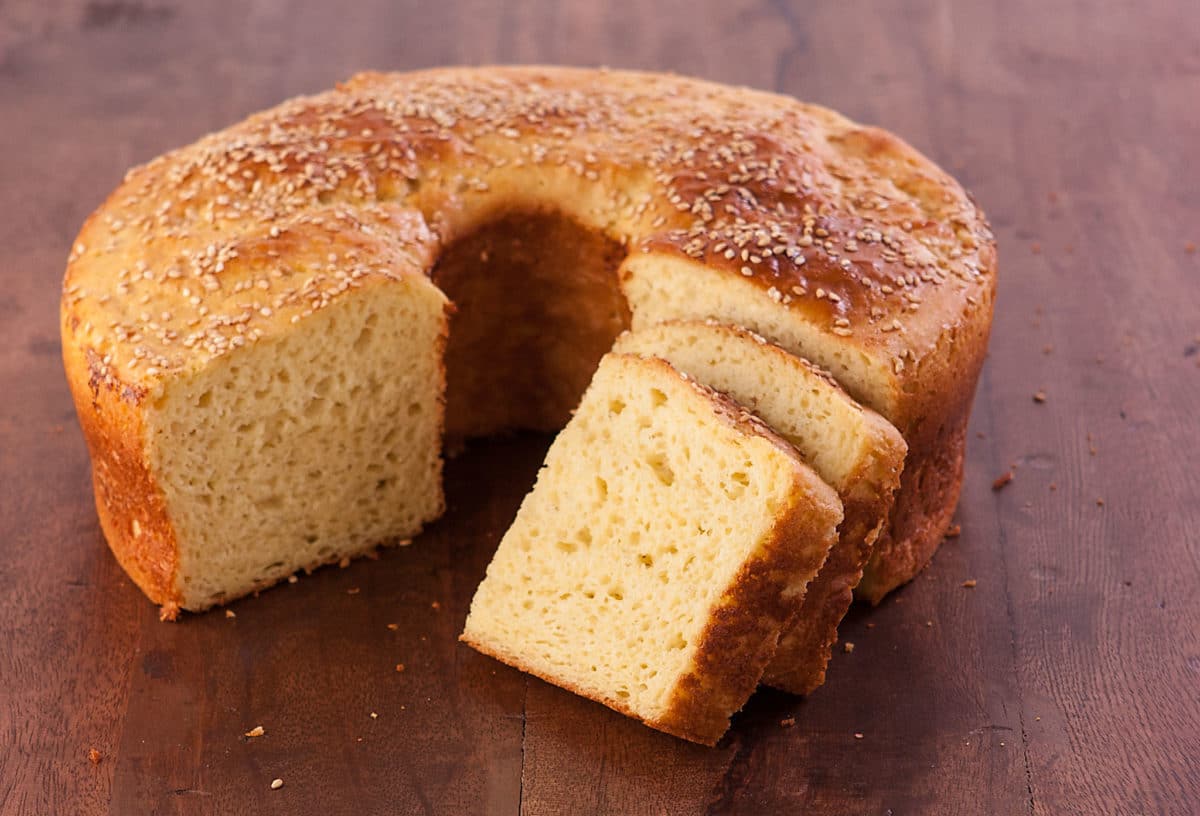Recipe from Nosh on This: Gluten-Free Baking from a Jewish-American Kitchen, copyright © Lisa Stander-Horel and Tim Horel, 2013. Reprinted with permission.
This challah requires some advance planning, but very little actual hands-on work. It’s pretty much a no-fail recipe. If you have the time to create the poolish — a starter that begins the fermentation process — the final bread flavor is incredibly worth the extra effort. The Expandex Modified Tapioca Starch makes all the difference in the bread, taking it from being just okay to being bendy and chewy, as you expect from bread. Your reward will be a challah that everyone will look forward to noshing.
Ingredients
For the poolish:
- •140 grams (1 cup plus 1 tablespoon) Nosh all-purpose gluten-free flour (see recipe in article)
- •175 grams (¾ cup) lukewarm water
- •½ teaspoon instant yeast, Red Star preferred
For the challah:
- •150 grams (1 cup plus 2 tablespoons) Nosh all-purpose gluten-free flour
- •60 grams (7 tablespoons) superfine sweet white rice flour
- •50 grams (5 tablespoons) tapioca starch
- •50 grams (5 tablespoons) Expandex Modified Tapioca Starch or additional tapioca starch
- •50 grams (4 tablespoons) sugar
- •14 grams (1 tablespoon) instant yeast, Red Star preferred
- •2 teaspoons (2½ teaspoons if not using Expandex) xanthan gum
- •2½ teaspoons salt
- •¼ teaspoon pectin
- •¼ teaspoon guar gum
- •240 grams (4 extra-large) eggs
- •75 grams (3 extra-large) egg yolks
- •40 grams (2 tablespoons) honey or Lyle’s Golden Syrup
- •75 grams (⅓ cup) canola oil
- •35 to 50 grams (2 to 3 tablespoons) sparkling mineral water, Pellegrino preferred
- •Nonstick spray, for greasing
- •60 grams (1 extra-large) egg, for brushing
- •2 tablespoons poppy or white sesame seeds


Preparation
To make the poolish:
Three to five days before baking the challah, combine the flour, water, and yeast in a small container. Whisk until smooth. Cover loosely with plastic wrap and leave out for 4 hours. Keep covered and refrigerate for 3 days, for best flavor. The poolish will have small bubbles but will not rise much at all. It will have a slightly sweet, fermented flavor if you taste it after a couple of days — that’s a good thing. Remove the poolish from the refrigerator on challah-baking day.To make the challah:
1. In a large bowl, combine both flours and the tapioca starch, Expandex, sugar, yeast, xanthan gum, salt, pectin, and guar gum and whisk. In a medium bowl, whisk four of the eggs, the egg yolks, and the honey and canola oil.Add 35 grams (2 tablespoons) of the sparkling mineral water to the dry mixture. Add the egg mixture to the dry mixture. Add the poolish. Using a fork, work the flour mixture into the wet mixture until it is just combined. Using the dough hook on an electric mixer on low speed, mix for 5 to 7 minutes, until the dough looks shiny and stretchy. If the dough looks very sticky and tough, add up to 15 grams (1 tablespoon) of additional sparkling water.
Grease a tube pan with nonstick spray. Place the dough all around the bottom of the pan, using a silicone spatula. Wet the spatula with water and smooth the dough. Cover loosely with greased plastic wrap and let the dough rise in a draft-free area until doubled in size, but not higher than the top of the pan, 1 to 2 hours.
Preheat the oven to 177° C/350° F. Beat the remaining egg and brush it gently over the top of the bread. Sprinkle the top with the seeds. Bake for 15 minutes and rotate the pan for even baking. Bake for 17 to 20 minutes and remove from the oven when the internal temperature is 85° C/185° F to 88° C/190° F on an instant-read digital thermometer and the top is pale golden brown. Don’t overbake the bread or it will be a little tough. Let cool in the pan for a couple of minutes and then transfer the bread to a rack to cool completely.

